
The BBC reports the United Nations panel investigating the case of WikiLeaks founder Julian Assange has ruled he has been “arbitrarily detained.” The U.N. says it will not confirm the report until Friday at 11 a.m. Geneva time. Assange first complained to the U.N. in 2014 that he was being arbitrarily detained since he could not leave the Ecuadorean Embassy in London without being arrested. Assange took refuge in the embassy in 2012. Assange wants to avoid extradition to Sweden over sex assault claims, which he has repeatedly denied. He says he fears Sweden will extradite him to the United States, where he could face trial for publishing classified information. Police say a warrant for Assange’s arrest remains in place. Assange has called for his arrest warrant to be dropped if the panel ruled in his favor. The BBC reports the panel’s ruling will not have any formal influence over the British and Swedish authorities. We go to London to speak with one of Assange’s lawyers, Jennifer Robinson, who says, “We hope and expect that the U.K. and Sweden will act accordingly.”
Transcript
NERMEEN SHAIKH: The BBC is reporting that the United Nations panel investigating the case of WikiLeaks founder Julian Assange has ruled he has been, quote, “arbitrarily detained.” The U.N. says it will not confirm the report until Friday at 11:00 a.m. Geneva time. Assange first complained to the U.N. in 2014 that he was being arbitrarily detained since he could not leave the Ecuadorean Embassy in London without being arrested. Assange took refuge in the embassy in 2012. Assange wants to avoid extradition to Sweden over sex assault claims, which he has repeatedly denied. He says he fears Sweden will extradite him to the United States, where he could face trial for publishing classified information.
AMY GOODMAN: Julian Assange had called for his arrest warrant to be dropped if the panel ruled in his favor. Earlier on Twitter, he announced, quote, “I shall exit the embassy at noon on Friday to accept arrest by British police as there is no meaningful prospect of further appeal. However, should I prevail and the state parties be found to have acted unlawfully, I expect immediate return of my passport and the termination of further attempts to arrest me,” he said. Police say a warrant for Assange’s arrest remains in place. The BBC reports the panel’s ruling will not have any formal influence over the British and Swedish authorities.
For more, we go directly to London. We’re joined by Jennifer Robinson, legal adviser to WikiLeaks founder Julian Assange, also director of legal advocacy for the Bertha Foundation.
Jen, welcome to Democracy Now! Can you explain what you understand the U.N. panel has found and what that means for your client, Julian Assange?
JENNIFER ROBINSON: Good morning, Amy. We have received reports from the BBC that the U.N. has found in favor of Julian’s application, which would mean that he has been found arbitrarily detained. We have not yet received formal confirmation of this. We expect to receive the decision at 9:00 a.m. tomorrow morning, and I’ll be with Julian in the embassy to understand the implications of that decision. So, at this point we’re unable to give comment until then. But we understand, as the reports have said, that this is what we expected. We expected and hoped this outcome.
The conditions of his detention over the past five years have been incredibly difficult. He meets the international legal definition of being arbitrarily detained, because he’s been granted the right to asylum by the Ecuadorean government in recognition of the risk of cruel and unusual punishment should he be returned to the United States. And that is an important international legal right. Should he have to leave the embassy, the U.K. and Sweden have refused, which is in breach of international law, to recognize that right to asylum, which means that he is arbitrarily detained.
NERMEEN SHAIKH: And, Jennifer Robinson, what do you make of the fact that this news was released by the BBC?
JENNIFER ROBINSON: The procedure for the U.N. working group is that the states in question who the complaint is about—in this case, the U.K. and Sweden—receive two weeks’ notification before we do, as the complainants, of the decision, in order to consider the decision and correct any inconsistencies if there were any problems with that decision. So they’ve had advance notice that we have not had. It seems to me that it must have been leaked by one of those—one of the states involved or sources within one of those governments, because we don’t have the decision yet.
AMY GOODMAN: I want to ask about the British government’s response to the BBC report. Speaking earlier today, a British government spokesperson said, quote, “We have been consistently clear that Mr. Assange has never been arbitrarily detained by the U.K. but is, in fact, voluntarily avoiding lawful arrest by choosing to remain in the Ecuadorean Embassy. An allegation of rape is still outstanding and a European Arrest Warrant in place, so the U.K. continues to have a legal obligation to extradite Mr. Assange to Sweden,” they said. Your response to this, Jennifer Robinson?
JENNIFER ROBINSON: Well, the U.N. Working Group on Arbitrary Detention is a body of eminent international law experts, who are charged—which was created by the U.N. Human Rights Commission to consider the international legal obligations of states, like the United Kingdom and Sweden, in reference to potential detainees. If the U.N. working group comes down and finds that this detention is arbitrary and unlawful, this clarifies for the United Kingdom and Sweden their obligations with respect to Mr. Assange’s case. If this is inconsistent with the way in which the United Kingdom has been acting, they will be found in breach of their international obligations and have an obligation to implement this report. So we hope and expect that if this decision is in Julian’s favor, that the U.K. and Sweden will take immediate action to implement the recommendations in the decision of this eminent working group within the U.N.
NERMEEN SHAIKH: But, Jennifer Robinson, the decision by the U.N., if it is, in fact, in favor of Julian Assange, is not legally binding. Is that correct?
JENNIFER ROBINSON: The U.K. and Sweden are both parties to the International Covenant on Civil and Political Rights and ought to welcome this decision from an eminent U.N. panel on the content and the method of implementation with respect to Julian Assange’s case. They are bound to implement that decision as a matter of international law, but it doesn’t have—it doesn’t have enforcement value within the U.K. domestic legal system.
AMY GOODMAN: So, Julian Assange tweeted out, quote, “I shall exit the embassy at noon on Friday to accept arrest by British police as there is no meaningful prospect of further appeal. However, should I prevail and the state parties be found to have acted unlawfully, I expect immediate return of my passport and the termination of further attempts to arrest me.” This is our last question, Jennifer Robinson: What will happen tomorrow?
JENNIFER ROBINSON: We will be hosting a press conference around noon tomorrow to discuss the implementation—the implications of the decision. It will be a—we have already written to the Australian government, and we’ll be seeking conversations with them about requesting the immediate return of Julian’s passport or, in fact, the immediate issue of a new passport, so that his—the implementation of this decision, if in his favor, can be—can take place immediately. We hope and expect that if this is in our favor, the U.K. and Sweden will act accordingly.
AMY GOODMAN: Well, we want to thank you very much for being with us, Jen Robinson, legal adviser to WikiLeaks founder Julian Assange.

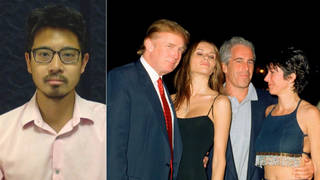
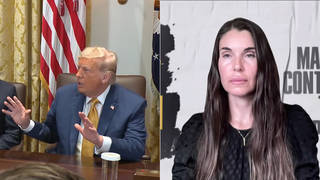
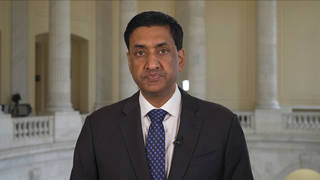
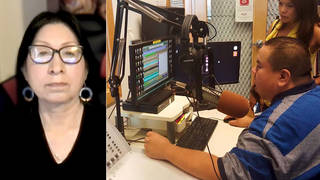





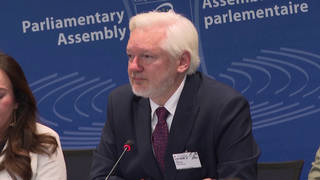

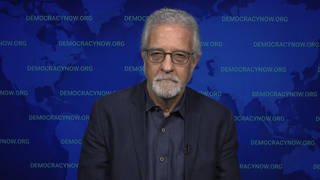
Media Options